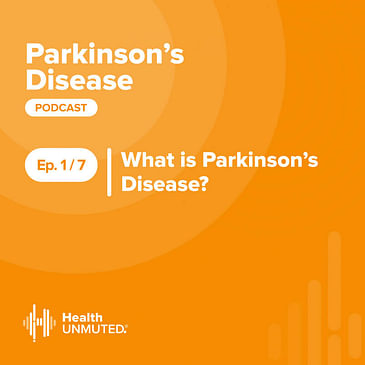The World Health Organization reports that the number of people with Parkinson's disease has doubled over the past 25 years, estimating over 8.5 million individuals living with Parkinson's globally. (1)
Parkinson’s is a degenerative condition which is often associated with tremors, imbalance and rigidity, but it affects every person differently.
In this first episode of the Parkinson’s Disease Podcast, we’ll start with the basics:
- What is Parkinson’s Disease?
- Who is at risk of developing Parkinson’s?
- What are some early signs of the condition?
We’ll also hear what it’s like to live with Parkinson’s disease from those diagnosed.
What did you think of this episode? We’d love to hear from you.
Please visit healthunmuted.com/feedback to let us know!
Resources
What is Parkinson’s?
- Webinar on recognising the early signs of Parkinson’s - Parkinson’s Foundation
- Other parkinsonion conditions - Parkinson’s Foundation
- Genetic causes of Parkinson’s - Michael J Fox Foundation
- Webinar on sleep disorders and acting out dreams - Michael J Fox Foundation
Terms Mentioned
- Dopamine - WebMD
- Tremor and Resting Tremor - Parkinson's Foundation
- Rapid eye movement (REM) sleep behavior disorder - Mayo Clinic
- Olfactory nerve - nerve relating to the sense of smell
- Hoehn & Yahr staging - Parkinson's Foundation
- Axial symptoms - these include symptoms such as walking disorders, posture disorders, and speech and swallowing disorders
Helpline
- Parkinson’s Foundation Helpline - 1-800-4PD-INFO (473-4636)
Podcast
Community Group
Guests’ Books
- Ending Parkinson’s Disease: a Prescription for Action by Ray Dorsey MD, Todd Sherer PhD, Michael S. Okun MD and Bastiaan R. Bloem MD PhD
References
A transcript of this episode is available below.
Transcript
[00:00:00] Jeff Lasley: I went home and searched on the internet for what is Parkinson’s, and that could be pretty horrifying.
[00:00:08] Anna: Parkinson’s disease impacts a million Americans, and over eight and a half million people worldwide. Receiving a diagnosis of this chronic condition can be life changing, but it doesn’t have to be life ending.
[00:00:27] Kat Hill: It is a big blow to one’s life. It’s hard and it takes some working through, but it does not mean your life is over. It does not need to be the end of who you are.
[00:00:39] Anna: In this first episode, we will cover the basics. Firstly, what is Parkinson’s disease?
[00:00:45] Dr. Mathur: Parkinson’s disease from a medical standpoint is a progressive, incurable, neurodegenerative disease.
[00:00:52] Anna: We’ll talk about what causes it.
[00:00:54] Christine Ferguson: There are so many different causes of Parkinson’s and it’s still not fully understood at this point. We know genetics plays a role, but we also know that your DNA is not your destiny.
[00:01:05] Anna: Who might be most at risk at developing Parkinson’s disease.
[00:01:08] Dr. Dorsey: Genetic factors account for only a small proportion, 15% or less, of individuals with Parkinson’s disease so it’s really environmental factors that have to be driving the rise of the disease.
[00:01:18] Anna: And what it’s like to live with Parkinson’s disease.
[00:01:21] Wayne: Parkinson’s is a unique disease and there are a whole laundry list of symptoms you can have, but you don’t have all of them. So everybody that has Parkinson’s disease is a little bit different.
[00:01:35] Anna: Welcome to the Parkinson’s disease podcast. I’m Anna Stoecklein, a registered nurse, and I’m your host as we learn more about this condition. Throughout this series, we’ll hear from people living with Parkinson’s and those caring for them to talk about their own journeys living with the disease. And we’ll also hear from medical experts and therapists, helping with those who’ve been given a diagnosis. At the end of every episode, we’ll share information and resources, so you can learn more and find new ways to connect with others living with Parkinson’s.
The information in this series was created for educational purposes only. It’s not a substitute for formal medical advice, diagnosis, or treatment. So if you have questions about a medical condition, talk to your qualified healthcare provider.
[00:02:20] Dr. Gilbert: I would tell people to educate yourself, go to the right websites, read, listen to this podcast, get good information. That could really be helpful and empowering too. Don’t panic because you’ve got this.
[00:02:33] Anna: That’s Rebecca Gilbert, she’s Chief Scientific Officer at The American Parkinson’s Disease Association.
[00:02:39] Dr. Gilbert: I’m also a movement disorders physician.
[00:02:42] Anna: A movement disorder physician is a neurologist, or an expert on the brain, with training and experience specifically in movement disorders, such as Parkinson’s disease. These are key members of the care team for a person with Parkinson’s.
[00:02:56] Dr. Gilbert: Parkinson’s disease is what we call a neurodegenerative disorder. And what this means is that it’s a disorder in which nerves in the brain, and also in different parts of the body die. The nerves in the brain that are affected are a subpopulation of nerves called the dopaminergic nerves. And these are nerves that communicate with other nerves using a chemical called dopamine.
[00:03:18] Anna: You may have heard of dopamine it’s, what’s known as a neurotransmitter and it’s made naturally by your body. Dopamine is used to send messages between nerve cells and throughout your nervous system, which controls and coordinates your body movement. That’s why it’s sometimes called a chemical messenger.
[00:03:39] Dr. Gilbert: When this particular subpopulation of nerves die in Parkinson’s disease, that is when we get these motor problems.
[00:03:46] Anna: A motor problem just means an issue relating to a person’s movement.
[00:03:51] Jeff Lasley: I started on my right side with a little tremor in my hand, and then it developed in my leg and then it went, eventually, to my left side. And I would shuffle my feet and especially my right foot, I would drag it. I mean, literally I could see my shoe wearing down more on my right side.
[00:04:09] Anna: That was Jeff Lasley. He was diagnosed in 2012 when he was 53. And we’ll hear more about his story throughout this series. Dr. Gilbert explains why it isn’t just movement that is affected by Parkinson’s.
[00:04:23] Dr. Gilbert: It turns out that there are many other populations of nerves in the brain that are affected in Parkinson’s. So nerves that may involve other chemicals, such as serotonin or acetylcholine.
[00:04:35] Anna: Just like dopamine, those chemicals are vital to the body’s functioning. So when they’re affected by Parkinson’s, it can cause non-motor related problems.
[00:04:45] Dr. Gilbert: Nerves that may affect function of the gut, nerves that may affect function of how big or small blood vessels become, nerves that affect the bladder, et cetera. And so really it is a disorder of the nervous system.
[00:04:57] Anna: Those nerves begin to function less well, and that’s when symptoms can begin to appear. Eventually they can die off altogether. These symptoms can be divided into two main categories, motor and non-motor problems.
[00:05:10] Dr. Gilbert: There are four, what we call, cardinal features or primary problems. One is a tremor. This tremor for Parkinson’s is classically a rest tremor. Which means that the tremor happens when your arms are not being exposed to any force. They’re resting in your lap or they’re dangling by your side. That’s when the classic Parkinson’s tremor happens. The others are slowness of movement, stiffness of movement, and problems with balance.
[00:05:38] Wayne: The symptoms that I had, other people didn’t see. Lack of coordination, not able to pick up coins off a counter or something like that. Simple things that other people wouldn’t necessarily attribute to an illness.
[00:05:52] Anna: Struggling with everyday movements can alert a person to the idea that they may be experiencing something abnormal that may be early symptoms of the disease.
[00:06:01] Jeff Lasley: My wife remembers that she came in and I was holding my toothbrush with two hands. I wasn’t really even aware that I was doing that. And she said, what are you doing? I said, brushing my teeth. And she said, why are you using two hands? I like, I don’t know, I need to.
[00:06:16] Dr. Gilbert: Some people find that they can’t get their arm in their coat or they can’t whisk an egg or they can’t make tuna. I’ve heard those three things a lot of times. They can’t mash the tuna, they can’t make that rapid movement.
[00:06:29] Anna: Alongside those better known Parkinson’s symptoms are those that are harder to spot.
[00:06:34] Dr. Gilbert: Problems with blood pressure, problems with the gut, problems with urination. And so really Parkinson’s disease becomes a disorder of the whole body, and it really requires a team effort to make sure that each of these problems is addressed as fully as possible.
[00:06:51] Dr. Mathur: I started to develop some non-motor symptoms, such as sleep disorder, and anxiety, and sometimes constipation problems.
[00:07:00] Anna: Researchers don’t know exactly what causes those nerves to die, but there are a number of risk factors that have been identified.
[00:07:07] Dr. Dorsey: My name’s Ray Dorsey, I’m a neurologist at The University of Rochester, and then co-author of the book Ending Parkinson’s Disease. So Parkinson’s disease is the world’s fastest growing brain disease. Genetic factors account for only a small proportion, 15% or less of individuals with Parkinson’s disease. So it’s really environmental factors that have to be driving the rise to the disease. Environmental factors include certain pesticides, industrial chemicals, including a chemical called trichloroethylene or TCE, and air pollution.
[00:07:37] Anna: And there are certain groups of people more likely to come into contact with those chemicals.
[00:07:41] Dr. Dorsey: So, the people who work with or live near these environmental toxins are the individuals who are at higher risk. In the United States, it’s shown that farmers are about 75% increased risk for developing Parkinson’s disease. One study suggest dry cleaners who use this chemical that’s widely used in dry cleaning are at increased risk for the disease. Not just people who work with these chemicals, pesticide applicators, people working in textiles, people working in degreasing, people working in electronics that are at risk. Those numbers alone are in the tens of millions, but we know that people who live in rural areas are at increased risk for developing Parkinson’s disease. Perhaps because the pesticides that are sprayed in the farms that they’re inhaling it themselves.
[00:08:22] Anna: However, just because you live near a farming area, doesn’t mean you’ll develop Parkinson’s.
[00:08:27] Dr. Gilbert: It isn’t a one to one. It isn’t, if I was exposed to X, I will definitely get Parkinson’s. It just doesn’t work as simply as that. What an exposure does is increase your risk so that you may have more of a chance of getting Parkinson’s, but it is definitely not a guarantee.
[00:08:44] Anna: So, if environmental factors aren’t solely responsible for causing a person’s Parkinson’s, other factors can affect the chances of developing it.
[00:08:52] Dr. Gilbert: The environmental risk may work in tandem with the genetics. So only people who have a certain gene and exposure to a certain chemical together have an increased risk, other people may not.
[00:09:03] Wayne: No, I don’t have Parkinson’s gene. And I obviously don’t know about my dad because he passed away in 1990. And that was before we could do that with gene mapping, so it wasn’t inherited.
[00:09:15] Anna: This is Wayne Folkston, though that isn’t his real name. It’s what we’ll refer to him as throughout this series.
Wayne was 68 when he was diagnosed. Research shows that age is the largest risk factor for Parkinson’s disease. Put simply, the older you are, the more likely you are to develop it. Dr. Dorsey explained the environmental risks that increase a person’s chances, but what about factors or ways of life that reduces a person’s risk?
[00:09:43] Dr. Gilbert: Another thing to keep in mind is that there are environmental risks that can protect you from Parkinson’s. So there may be exposures that you’ve had in your life, for example, which decrease your risk of Parkinson’s. So it isn’t all about something that’s being done to my body that I can’t prevent that led me to this.
[00:10:00] Anna: So there are things a person can do to protect themselves as well. You’ll hear many experts throughout the series express the importance of exercise, here’s why.
[00:10:09] Dr. Gilbert: I really cannot emphasize this enough. There are studies that have shown that midlife exercise decreases your risk. So people who exercise don’t develop Parkinson’s as much as those who don’t. And so that’s definitely something to take to heart. And then in addition, once you have a diagnosis of Parkinson’s, clearly staying active, involving yourself in exercise as much as possible, has been shown to be effective, both for the motor symptoms, as well as the non-motor symptoms of Parkinson’s.
[00:10:37] Anna: So even those listening, who aren’t living with Parkinson’s disease, now is as good a time as any to get up and active.
[00:10:44] Wayne: I went out right away and bought a stationary bicycle. I tried to create a mini gym here at home. And I took Tai Chi, which was also good for teaching me how to shift my weight and place my feet and helps me with balance because balance is a continuing problem.
[00:11:01] Dr. Gilbert: Stay active and stay fit. That can be really helpful for all your organs, your heart, your lungs. And whatever’s good for your heart is good for your brain. Because then you have nice clean blood vessels that bring the blood to your brain.
[00:11:14] Anna: We’ll return to the ways people with Parkinson’s can build an exercise routine in a later episode.
The Parkinson’s disease podcast is part of the Health Unmuted library. Search for Health Unmuted on your podcast player to find series on a host of other health conditions.
We’ve been talking about some of the first symptoms of Parkinson’s disease. Now let’s talk about what’s happening even before those symptoms start to show.
[00:11:42] Dr. Lisk: We know from neuropathologists that Parkinson’s disease can start in the brain years, maybe even a couple decades, prior to having any physical sign or symptom, you could look completely normal.
[00:11:56] Anna: That’s Dr. Jerome Lisk.
[00:11:58] Dr. Lisk: I am a neurologist, I’m a senior medical advisor for several healthcare startups and other healthcare companies that are in the digital world. And now I am in Denton, Texas in a single specialty group.
[00:12:12] Anna: Some of the earliest symptoms may have nothing to do with your movement at all.
[00:12:16] Dr. Lisk: One of those non-motor symptoms is called REM Sleep Behavior Disorder.
[00:12:21] Anna: REM sleep is probably a phrase you’ve heard of before. It refers to Rapid Eye Movement sleep and is the stage of the sleep cycle where most of our dreaming occurs, and the brain is most active.
[00:12:34] Dr. Lisk: Everyone’s had these wild dreams or dreams where you’ve like maybe been fighting or doing something.
[00:12:41] Anna: When we’re sleeping, our brain stem is paralyzed, so our body’s motionless no matter what is happening in our dreams.
[00:12:49] Dr. Lisk: But in REM Sleep Behavior Disorder, this is not working very well. So now you could actually act out your dreams. So you’re not totally paralyzed. You could actually move.
[00:13:00] Anna: This can be one of the earliest signs of the onset of Parkinson’s.
[00:13:04] Jeff Lasley: Sometimes people lash out and will hit their partner, if they’re sleeping in the same bed. I haven’t quite gone that far, but I was acting out my dreams and talking a lot in my sleep.
[00:13:18] Wayne: If I’m dreaming about fighting off a grizzly bear or something, well, I’m thrashing around in the bed and fighting the bear and my wife doesn’t like that because swinging my arms around, it might hurt somebody. There is medication for that, but it didn’t work last night. And I found myself up out of bed and I ran into a wall and that’s a strange feeling to wake up from a sound sleep, and you’re standing up against a closet door, rather disorienting.
[00:13:45] Dr. Lisk: The next thing is decrease sense of smell or absence of smell. I have people who tell me, I haven’t been able to smell for 30 years. People can have decreases of smell as one of the first sides because Parkinson’s disease starts. In the olfactory bulb of the brain and in the brain stem.
[00:14:03] Anna: It’s the nerves in this part of the brain dying that causes the loss of smell.
[00:14:08] Jeff Lasley: I’d actually had a decreased sense of smell going back. Many years before that I had worked as a painter in a truck factory in Portland, and I kind of attributed to being around those chemicals, deadening my sense of smell, but looking back, it may have been a precursor to my Parkinson’s.
[00:14:26] Anna: As Dr. Gilbert explained earlier, lots of nerves around the body are affected by Parkinson’s, including those that support the gut and food digestion.
[00:14:34] Jeff Lasley: Constipation is a real common problem. And I’ve dealt with that for a long time.
[00:14:40] Anna: These emerging symptoms that can occur as a precursor to diagnosis can also be discovered after a diagnosis.
[00:14:47] Dr. Lisk: There are no physical signs at this point. So people with Parkinson disease can get constipation, REM sleep behavior disorder, and the REM sleep behavior disorder could happen one time and then never happen again. Or it could happen after your diagnosis, but it could happen 20 or 30 years before you develop any physical sign, decreases in smell could it be three to seven years before constipation could be five to 10 years before.
[00:15:13] Anna: There are also mental health symptoms that may appear as indicators of early Parkinson’s disease.
[00:15:19] Kat Hill: My early symptoms, probably my earliest symptom was anxiety.
[00:15:25] Dr. Lisk: Anxiety can also occur prior to symptoms because these are neurotransmitter imbalances. And another early neurotransmitter is called serotonin.
[00:15:35] Anna: An imbalance in serotonin can lead to a low mood and feeling depressed.
[00:15:40] Jeff Lasley: Depression can be a real problem for people with Parkinson’s, just it’s not only the fact of what you’re dealing with, but just as sort of a symptom of the disease.
[00:15:52] Anna: So mental health symptoms such as anxiety and depression can be early signs of Parkinson’s, but they’re also common in the general population. Dr. Gilbert explains the other conditions that can be diagnosed with similar symptoms.
[00:16:06] Dr. Gilbert: Parkinson’s disease is thought to be a single pretty well defined disorder. There are other diseases, other neurodegenerative diseases that share some features with Parkinson’s disease, but are actually different disorders. And we group these disorders under the umbrella of Parkinsonism or Parkinsonian disorders.
[00:16:25] Anna: Other conditions include progressive supernuclear palsy, PSP, and multiple system atrophy. More information on other Parkinsonian disorders can be found in the notes on our website, hupstaging.wpengine.com.
While the experience is different for everyone Parkinson’s is a progressive disease. Meaning symptoms tend to worsen over time, stages help measure how a person’s disease has progressed, but it’s not that simple. Dr. Gilbert explains.
[00:16:55] Dr. Gilbert: The staging of Parkinson’s disease, classically focused on the motor symptoms of Parkinson’s. So there is a staging called the Hoehn and Yahr staging, which goes from one to five. Stage one is motor symptoms on one side of the body that may mean a tremor on one side of the body, may be a rest tremor on one side and maybe slowness on one side. And that’s stage one.
Stage two is that you have this slowness or stiffness or tremor on both sides. And stage three is when your balance starts to be involved. And that’s what we call axial symptoms.
[00:17:30] Anna: Those refer to the center of your body.
[00:17:32] Dr. Gilbert: If you are a stage three, your balance may be affected, but you’re still able to complete your daily activities on your own. Stage four already you may need some help to walk and you may even need a walker chronically, by stage five, you really can’t get out of bed or be mobile without the help of someone else. So that’s the staging of Parkinson’s disease.
[00:17:55] Anna: However, these stages don’t account for the non-motor symptoms, such as the urinary issues, cognitive impairment and bowel problems that Parkinson’s can cause.
[00:18:05] Dr. Gilbert: Non-motor symptoms can be more disabling than motor symptoms. And so not including that in the staging really makes the staging not so useful in terms of how advanced Parkinson’s.
[00:18:16] Anna: If you’d like to learn more about Parkinson’s disease, head to hupstaging.wpengine.com to find a full list of resources, including a Parkinson’s 101 guide and an animated video from the Michael J Fox Foundation. And there, you will also find ways to get involved with global and local advocacy organizations, such as PD Avengers, as well as a selection of other podcasts you may find helpful as you continue to learn more about this disease, like the podcast Substantial Matters the Life and Science of Parkinson’s.
In the next episode, Dr. Gilbert and Dr. Lisk will return with colleagues to explain how the diagnosis process for the disease happens.
[00:18:56] Wayne: My wife was complaining about, she couldn’t hear me and I thought I was speaking loud enough, but I wasn’t. And then the stoops, my posture was getting worse and those were essentially my first three symptoms I had to deal with.
[00:19:10] Anna: We’ll hear from people with Parkinson’s about their experience being diagnosed as well as from mental health professionals, Parkinson’s doctors and other key members of a Parkinson’s care team.
[00:19:21] Jeff Lasley: If you’ve been diagnosed with Parkinson’s, it’s not the end of the world. It’s the beginning of a new journey.
[00:19:28] Anna: In this episode we heard from Dr. Ray Dorsey, more information about his book Ending Parkinson’s and other books our guests have recommended can be found in the resource list. Thanks to Dr. Dorsey, Dr. Lisk and Dr. Gilbert for their medical expertise and to Kat Hill, Jeff Lasley, Wayne Folkston and Dr. Mather for sharing their personal experiences.
This is the Parkinson’s disease podcast hosted by me Anna Stoecklein this show is a part of the Health Unmuted audio library by Mission Based Media, to listen and learn more visit hupstaging.wpengine.com and follow our show on your favorite podcast player.








